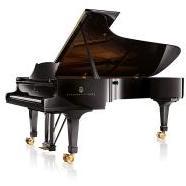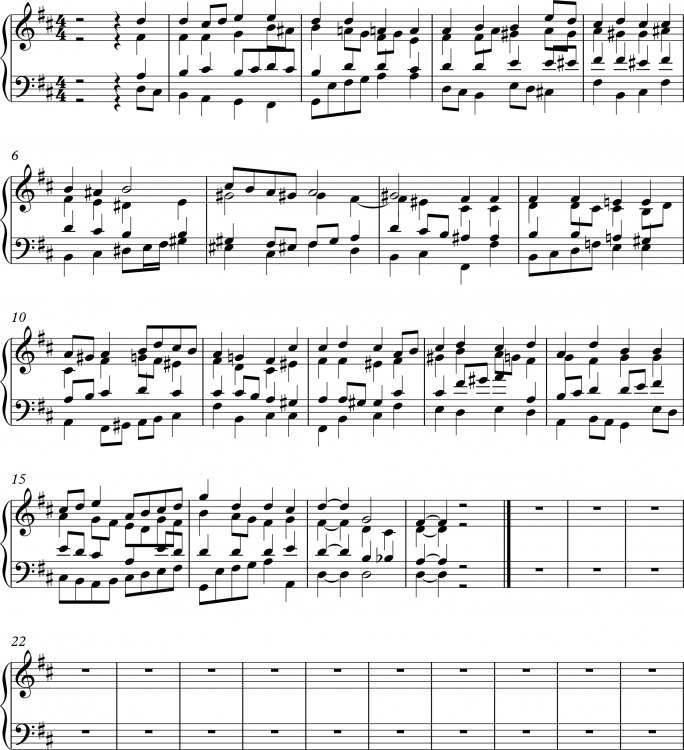Search the Community
Showing results for tags 'satb'.
-
Hi All, Just joined this place after somebody recommended it to me. I have this large choir piece that I recently wrote, and I'm wondering if anybody would like to give feedback on it? If you have an questions on what anything means, please let me know! Best Regards, Thomas Håkanson, aka Dusty
-
This is a Christmas carol for SATB chorus, based on William Shakespeare's poem "Song of the Holly"
- 15 replies
-
- 2
-

-
- chorus
- shakespeare
- (and 4 more)
-
Hi everyone! I'd like to share a choral piece I'm working on (I think it's mostly in the final stages of composition, perhaps a few notes here and there will be edited, but I think have the form/structure as I would like it.) I set one of my favorite e e cummings poems to music and just felt my way through the text and the emotions I felt while reading. I'd love to hear any critiques from people more experienced with the idiom (I'm studying composition at university, but only started 2 years ago so I am still learning things everyday!) I intend to speak with the choir directors at my university to see if they would be interested in running the piece, and if they have any advice on writing effective choral music. One of the things I am particularly worried about with this piece is the clarity of notation. There are a few parts of this piece where I was unsure of what accidentals to use (such as in the "i fear" section at bar 32) or if I spelled a chord incorrectly, as I predominantly write by ear. If anyone could shine some light on potential problems in this regard, that would be extremely helpful. Thank you in advance for any feedback! i carry your heart with me (i carry it in 12-29-17.mp3 i carry your heart with me (i carry it in 12-29-17.pdf
-
I just finished up my Christmas composition project. Here's a two minute piece on the topic of "you need to define a thing to be able to think about a thing, so that you have a word to attach your thoughts to." Apparently blue is the last color to gain a word in any language. There are still languages that haven't evolved a word for the concept of "blueness" yet. One theory is that color words appear as we need to be able to distinguish between things that we want to buy, sell, or trade: "Yeah, I can make you a new deer skinning knife. What color do you want the handle to be?" "Blue." Because blue paints and dyes are relatively difficult to produce, compared with other colors, cultures don't develop a word for "blue" until they are pretty advanced. The cultures that don't have a word for it, interestingly have a hard time seeing and thinking about it as well. Scientists have done experiments where they have say, three green squares and one blue one, and ask these language users to pick out the square that is not like the others, and people have a very difficult time with the task. It seems that our brains need a word to attach a concept to in order to think about the concept. We need to think using our interior monologue. Actual language has to be running inside or outside of our heads in order for us to think in any meaningful way. It's an explanation for why you can't do basic math and listen to someone having a conversation involving numbers at the same time. So get out there and learn the names of things, any kinds of things, and your basic thought processes will deepen. I'd suggest that you open the score while you listen so you can see how the text fits the notes, or click the youtube link below. It has the score scrolling along behind the music. And I used a harp sound instead of piano, because all the piano sound fonts that come with my composition software are pretty clunky, but I do intend this to be piano accompaniment. Thanks for listening and I'd love to hear any thoughts about this piece! Furtak-Semantic.mid
-
Hello, friends! I am very new to this forum, and just thought I would put this setting of Shakespeare's 8th Sonnet out here. I am open to any criticisms or feedback you have to offer. I apologize for the sub-par recording. The choir did not have overlong to rehearse, and the tenor and sopranos are especially strident sometimes. Which may be partly my fault at times, but it wasn't all my fault! Haha.
-
I love this text from Pliny the Elder's "Natural History," and I think it suits itself particularly well to text painting as a choral piece. I'd love any feedback, but particularly if you notice problems with my use of the latin (I never studied latin), or can think of any changes I should make to the piano reduction (I'm not a pianist.) Thanks! sed turrigeros elephantiorum miramur umeros taurorumque colla et truces in sublime iactus, tigrium rapinas, leonum iubas, cum rerum natura nusquam magis quam in minimis tota sit. ...cum in contemplatione naturae nihil possit videri supervacuum. We marvel at the shoulders of elephants carrying turrets, and bulls tossing aside whatever stands in their way with their strong necks, at the ravening of tigers, at lions' manes, but Nature is nowhere greater than in her smallest works… in the study of the natural world, nothing is superfluous. Here is a youtube of the music with the score rolling by. [Edited 6/12/24 to add multitrack recording version of YouTube demo].
- 9 replies
-
- pliny the elder
- chorus
-
(and 4 more)
Tagged with:
-
https://soundcloud.com/ian-campbell-89/d-major-chorale-new-version This is the first draft of a little composition assignment I had for a theory 2 class. I am providing audio with piano rendition and have it scored condensed just because it is more practical. I did not put the fermatas in the score but you will be able to tell where they are from listening to the audio with where it elongates at those points. I'm not really trying to emulate Bach but it would be nice to learn more about Bach chorale harmonization, and as many specific critiques and tips as possible would be good. There are a few things like parallel 5ths across a fermata, and parallel octaves in one place, that I already fixed.
-
Hi, I've never composed before but I decided to give it a try this afternoon. This piece is odd I admit, but I love bizarre 20th century music. It was written based on the town I grew up in. I assigned a specific note to each letter of the town/province I grew up in by random selection and then used it as a continuous motif throughout the entire piece in the soprano line. I then based the rest of the composition on specific elements of my town ie. old French folk songs, the train, the prairie winds, change of seasons, nature, and the emptiness of prairie winters. I hope you enjoy it! *Thank you for your comment. I've temporarily taken down the midi file and will re-upload a file that is more accommodating.
- 1 reply
-
- 20thcentury
- newmusic
-
(and 2 more)
Tagged with:
-
Hi all! I've been busy with small business busy season, but I'll be a bit more present on this site after the Christmas rush is over. Here's a short fall piece I managed to put together. I'd love to hear any feedback, particularly any comments about my piano reduction notation, since I don't actually play piano. I simplified a few rhythms to try to make the choral counterpart actually playable, but if you can think of better solutions, let me know. If anything looks like it would be easier played with the other hand, or my enharmonic equivalents should be switched from sharps to flats or the reverse, please let me know. Notation that's just a little "off" always slows down rehearsals so I do want to do it right, but I don't always know the best way to do it. I've attached a pdf of the score. And here's a video with the score rolling by: -pateceramics Furtak-The Rake.mid
-
The Congregational Church of Needham was nice enough to do a Sunday service of music I'd written and let me record it. There were only 9 singers, but they still did a great job. I made a little youtube video below, and am also attaching the sound file and a pdf of the score:
- 1 reply
-
- satb
- a cappella
-
(and 1 more)
Tagged with:
-
Meistersingers is proud to present their 6th Annual Choral Composition Competition. Also, we are extremely excited to release this announcement under the new name, the Knapp Award. Named in honor of Jim and Sally Knapp, ardent supporters of Meistersingers, their commitment will ensure this competition will continue for many years to come. In the 6th year of its existence this competition has received over 400 submissions, more than half created specifically for Meistersingers. With $5000 in prize money awarded to date, to both established and upcoming composers, Meistersingers is committed to fostering the future of the choral art. Please visit www.meistersingers.org for more information and the application Postmark Deadline: March 1, 2012 Prize: *$1,000.00 and at least two performances by Meistersingers *Archival recording for winner’s use toward publishing *Possible commercial recording by Meistersingers There is a $25 entry fee Submission Guidelines: Complete Competition Submission Form (can be downloaded from www.meistersingers.org) Original Composition for 4-8 part SATB a cappella choir (further divisi possible/range is not an issue) Texts focusing on light or dark themes are preferred. 4-8 minutes long Must be a world premiere performance (rehearsal read-throughs are acceptable) Anonymous Submission - Remove all names (except poet, if necessary) and identifying marks; - Provide a sealed envelope containing your name, address, email, the title and performance history of the piece (if applicable), and phone number. Submit a legible, photo-copy ready, score with piano reduction for rehearsal purposes - including a recording (MIDI, piano, etc.) is strongly encouraged but not required. If text is not in public domain, composer is responsible for including written permission to use it Selection Process: The Music Director/Conductor, Brian Dehn, shall review all scores received. A Selection Committee, consisting of members chosen by the Music Director/Conductor and Board, shall review many of the scores received. The decision of the Music Director/Conductor and Selection Committee will be final. Winning Composer will be notified by April 2, 2012 Other Items of Interest: Texts that focus on dark/light/day/night are preferred as our summer concert is centered on those themes. The winning composition is scheduled to be performed in May of 2012 in the Southern California area. Meistersingers encourages the composer’s attendance and cooperation in media publicity and press coverage. The winning composer must provide a final performance score by April 6, 2012. Meistersingers shall make 35 copies for the chorus, director, and rehearsal accompanist. There are no restrictions according to race, sex, or age. A composer may submit more than one piece. Meistersingers reserves the right not to select a winning composition and/or award a prize. A brief description of Meistersingers, including Mission Statement and type of literature performed, can be found on their website: www.meistersingers.org Send all Submissions, along with form to: Meistersingers, Inc. Knapp Award 8941 Atlanta Avenue #187 Huntington Beach, CA 92646 For further information, visit the website or email bdehn@meistersingers.org Application.pdf Knapp info.pdf
-
- a cappella
- satb
-
(and 5 more)
Tagged with:





